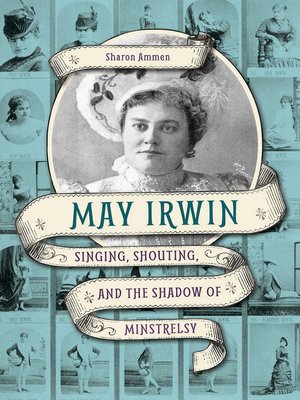May Irwin
ebook ∣ Singing, Shouting, and the Shadow of Minstrelsy · Music in American Life
By Sharon Ammen

Sign up to save your library
With an OverDrive account, you can save your favorite libraries for at-a-glance information about availability. Find out more about OverDrive accounts.
Find this title in Libby, the library reading app by OverDrive.



Search for a digital library with this title
Title found at these libraries:
| Library Name | Distance |
|---|---|
| Loading... |
May Irwin reigned as America's queen of comedy and song from the 1880s through the 1920s. A genuine pop culture phenomenon, Irwin conquered the legitimate stage, composed song lyrics, and parlayed her celebrity into success as a cookbook author, suffragette, and real estate mogul.
Sharon Ammen's in-depth study traces Irwin's hurly-burly life. Irwin gained fame when, layering aspects of minstrelsy over ragtime, she popularized a racist "Negro song" genre. Ammen examines this forgotten music, the society it both reflected and entertained, and the ways white and black audiences received Irwin's performances. She also delves into Irwin's hands-on management of her image and career, revealing how Irwin carefully built a public persona as a nurturing housewife whose maternal skills and performing acumen reinforced one another. Irwin's act, soaked in racist song and humor, built a fortune she never relinquished. Yet her career's legacy led to a posthumous obscurity as the nation that once adored her evolved and changed.
| Cover Title Contents Acknowledgments Introduction: May and Me 1. Never Were There Such Devoted Sisters 2. Stardom Photo Group A 3. The Profoundly Troubling History of the Coon Song 4. The "Only One Boss Bully" Photo Group B 5. Unbounded Domesticity 6. Causes and Compromise 7. The Road to Rainbow's End Photo Group C Epilogue: Me and May Chronology Notes Selected Bibliography Index | This is a valuable biographical study that assesses May Irwin's contributions to comedy while also forging a path that avoided some of the grotesque and low comic traditions associated with female characters. Ammen reassesses Irwin's work in vaudeville and musical comedy, discussing her in relation to both race and gender, and this is a welcome and much needed work on a remarkable comedienne.—Gillian M. Rodger, author of Champagne Charlie and Pretty Jemima: Variety Theater in the Nineteenth Century
"Lovingly rendered and well researched without being simplistic or missing the larger cultural and political context in which May Irwin lived and produced."—Andrew L. Erdman, author of Queen of Vaudeville: The Story of Eva Tanguay
|
Sharon Ammen is professor emerita of theatre at Saint Mary-of-the-Woods College, Indiana.
Sharon Ammen's in-depth study traces Irwin's hurly-burly life. Irwin gained fame when, layering aspects of minstrelsy over ragtime, she popularized a racist "Negro song" genre. Ammen examines this forgotten music, the society it both reflected and entertained, and the ways white and black audiences received Irwin's performances. She also delves into Irwin's hands-on management of her image and career, revealing how Irwin carefully built a public persona as a nurturing housewife whose maternal skills and performing acumen reinforced one another. Irwin's act, soaked in racist song and humor, built a fortune she never relinquished. Yet her career's legacy led to a posthumous obscurity as the nation that once adored her evolved and changed.
| Cover Title Contents Acknowledgments Introduction: May and Me 1. Never Were There Such Devoted Sisters 2. Stardom Photo Group A 3. The Profoundly Troubling History of the Coon Song 4. The "Only One Boss Bully" Photo Group B 5. Unbounded Domesticity 6. Causes and Compromise 7. The Road to Rainbow's End Photo Group C Epilogue: Me and May Chronology Notes Selected Bibliography Index | This is a valuable biographical study that assesses May Irwin's contributions to comedy while also forging a path that avoided some of the grotesque and low comic traditions associated with female characters. Ammen reassesses Irwin's work in vaudeville and musical comedy, discussing her in relation to both race and gender, and this is a welcome and much needed work on a remarkable comedienne.—Gillian M. Rodger, author of Champagne Charlie and Pretty Jemima: Variety Theater in the Nineteenth Century
"Lovingly rendered and well researched without being simplistic or missing the larger cultural and political context in which May Irwin lived and produced."—Andrew L. Erdman, author of Queen of Vaudeville: The Story of Eva Tanguay
|
Sharon Ammen is professor emerita of theatre at Saint Mary-of-the-Woods College, Indiana.







